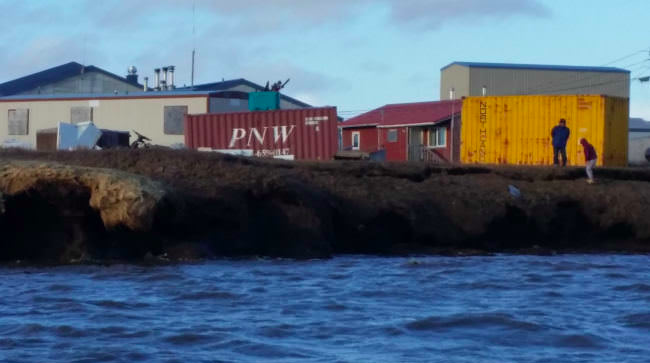FOCUS SHIFTED FROM HONEY BUCKETS TO CLIMATE CHANGE
Joel Neimeyer’s last day as the federal co-chair of the Denali Commission is Friday. The grant making agency has had eight years that at times were about as drama-filled as a slightly feral arm of the federal government can get.
The Alaska delegation has interviewed candidates for Neimeyer’s replacement; Sens. Murkowski and Sullivan along with Congressman Young will forward the name of their preferred candidate up their chains of command and on to Secretary of Commerce Wilbur Ross, who will make the appointment. This could take a while.
Corrine Eilo, who serves as Denali Commission financial administrator, will likely become acting co-chair, the day-to-day manager of the agency.
The Denali Commission was a creation of the late Sen. Ted Stevens in the late 1990s to funnel grants into rural Alaska that would improve infrastructure. After all, rural Alaska lagged behind in basic services that urban Americans take for granted, and Stevens was a master at getting grants for Alaskans.
The commission’s congressional charter was limited to providing job training and other economic development assistance to distressed rural areas, and providing for rural power generation and transmission facilities, modern communication systems, water and sewer systems, and other infrastructure.
In plainer language, much of the purpose was to bring safe water and sewer systems to remote areas, where sewage lagoons, honey buckets, and unsafe wells were the norm; and to get power generation and safe fuel tanks in place.
Over the years, it has helped build power plants and fuel tanks in dozens of rural communities, and also health care facilities. More than 2,000 projects have been funded or partially funded.
But the agency is often criticized for a lack of accountability.
The agency’s own inspector general wrote to Congress and recommended the agency be shuttered: “I have concluded that (my agency) is a congressional experiment that hasn’t worked out in practice,” he wrote. “I recommend that Congress put its money elsewhere.”
[Read Mike Marsh’s assessment of Denali Commission’s mission and practicalities]
In 2013 Sen. Lisa Murkowski called on the Government Accountability Office to review the auditors report. He was, after all, reviewing the Denali Commission from his office in Phoenix, Ariz., and Alaskans thought maybe he didn’t understand the full picture. Soon, a report on the watchdog was issued that was critical of his work.
That was a low point.
By 2015, President Barack Obama added a climate change component to change the focus toward relocating villages that are too close to the water and are being threatened by the lack of shore ice to protect them during fall and winter storms.
Although it hasn’t made the news lately, fiscal conservatives mutter about mission drift. With the focus shifting to climate change and a $15 million federal award to the Denali Commission for help move Newtok away from the Ninglick River, the commission has a new lease on life.
That award represents half of the commission’s budget and has influenced the entire course of its work.
But moving Newtok is going to cost up to $130 million — just for the infrastructure, according to the U.S. Army Corps of Engineers. $15 million doesn’t move a village.
In fact, there’s no one agency that seems to have the responsibility for Newtok’s relocation, which doesn’t bode well for federal funds being moved around between cooperating agencies. Bureaucracies act like sponges whenever funds are around and no one has ultimate responsibility.
A visit to the Denali Commission web site finds few goals or deliverables outlined, no specific accomplishments heralded, no timelines or milestone dashboards to view progress, and no transparency about whether the agency has established its worth.
Instead, the reports refer to the agency’s role in various activities, how the agency “works with” other agencies, its involvement with work groups, cooperative projects, its participation at the table, and its “special role in increasing government effectiveness.” The definition of a bureaucracy.
At the very least, the commission has a communications problem: It needs to establish its value proposition better.
The next federal co-chair will be taking over a federal agency that has drifted. He or she will want to explain better to funders — the American taxpayers — what the return on their investment has been over the past 20 years, how Americans’ lives have been improved, and what the agency will produce as a work product in the next four years.
